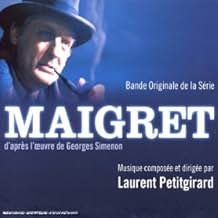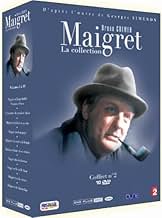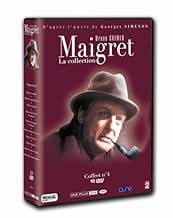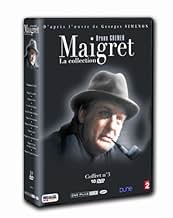अपनी भाषा में प्लॉट जोड़ेंThe pragmatic, reserved and refined Maigret investigates murders in his singular unhurried manner and inevitably discovers the truth.The pragmatic, reserved and refined Maigret investigates murders in his singular unhurried manner and inevitably discovers the truth.The pragmatic, reserved and refined Maigret investigates murders in his singular unhurried manner and inevitably discovers the truth.
- पुरस्कार
- कुल 1 जीत
एपिसोड ब्राउज़ करें
फ़ीचर्ड समीक्षाएं
Well......having recently obtained MhZ Choice thru Roku, will be able to do a sloooow binge-watch this whole Winter of my now recent favorite French detective, Maigret! I had seen bits and pieces on PBS, but MhZ has them all: all 9 years! Dragging out my special snacks, along with tooth-picks to prop up my eyelids and eye-drops to reduce the tell-tale redness, its going to be an occupied Winter fer shur! Deepest thanks to French television! Viva le France! I wonder if I'll be able to speak French when finished? EMBRACE the sub-Titles!
I have only recently become familiar with Maigret and I am thrilled with the program. Hopefully I can find and watch all of the episodes.
Thank you...
Thank you...
There are two great Maigret adaptations available online or in DVDs from the 1990s, the British version done by Granada for two seasons in 1992, starring Michael Gambon, and the Dune French version that lasted from 1991 until 2005 with Bruno Cremer. Both have strong qualities, although in many ways they are completely opposite. Gambon's Maigret is affable, poetic, emotional, sympathetic, and works in close concert with his men; his Paris (Budapest) is sunny and bright. Cremer's Maigret is taciturn and intense, preferring to wait silently while people reveal themselves, riding his men hard at times, especially the often incompetent officers he encounters outside of Paris; and his Paris (Prague) is always gray or pitch black, dark wet streets, his pipe glowing. In many ways the visual look of the shows are opposite, with the British series relying more on the romance and nostalgia of Paris, while the French series is a showcase for the dark psychological mysteries of Simenon. The French series hews more closely to the original stories, and also has the advantage of the episodes being 30 minutes longer; it is also a more complete canon, with nearly 5 times as many stories. In the Gambon series, Gambon is more pleasant, his men work with him as a clever team, and we see much more of Mme. Maigret, who appears in nearly every episode, but the humor and the characterizations are typically British, which can be somewhat disconcerting. The Cremer Maigret varies in quality with the directors, but he is almost always brilliant, playing his hunches and guiding his investigations with a deep psychology that truly honors the original Simenon novels. And it goes almost without saying, the French version pulls no punches and has a much darker way of exploring aspects of the French character that the heart of Simenon; Cremer spends a lot of time listening to people and asks questions which seem strange but reveal hidden truths. Gambon's Maigret does more of the talking and seems to succeed more through luck and teamwork, which may be failings of the shorter format and the transition from French to English storytelling. I'm fond of them both, but the Cremer Maigret is one of my favorite television programs, with plenty to love, at over 75 hours. It is also possible to watch the Cremer Maigret's over and over, picking out new clues and details, but there is no such depth to Gambon's Maigret.
The Bruno Cremer "Maigret" series is exceptional and reminds me of those great British books-to-television mystery series from the 80s/90s such as Jeremy Brett's Sherlock Holmes, David Suchet's Hercule Poirot, and (my favorite) John Thaw's Inspector Morse. What I enjoy most about the Cremer series is how well it captures the atmosphere-bars, bistros, apartments, mansions, the wet pavement of the streets, peripheral noises, the varied dialogue, and the quiet moments--that the author George Simenon brings to his books (both his "Maigret" titles and his other novels--I've read all the Maigret stories and several of his other titles). One doesn't read Simenon's Maigret mysteries simply for setup, epiphanous moment, and denouement. I would say the same is true of watching this series. Getting to and finding out "Who did it?" matters, yes, but only a bit. The best parts are the lingering moments in between.
One wise decision made in developing this Maigret series is that all episodes are set in the late 40s through the 50s. Simenon's Maigret novels span across several decades (30s - early 70s) and the change in ages, fashions, cars, and architecture would have been a challenge. And of course, there would have been the war years and the German occupation of Paris. While not actually shot in Paris, who cares? This is the Paris of the late 40s and early 50s, maybe not in reality but the Paris of our-at least, my-imagination, the Paris that Simenon paints in his stories. Capturing that look and feel is crucial if one is to film Simenon. I applaud the filmmakers.
Generally, these episodes adhere to their corresponding novel. Not always and seldom perfectly. I don't mind an addition or embellishment here or there. It's the nature of book-to-film, but if one does it then one better do it well. In this series, it's usually, but not always, done quite well. Bruno Cremer embodies Maigret and delivers, for me, the character I imagined when reading the novels. I'm grateful for the 54 episodes in this series. I wish there were more. (There are over 100 Maigret stories counting both novels and short stories.)
BY THE WAY, In Simenon's Maigret stories, Maigret's assistants change with some being given more prominence than others in different books. Those assistants include Lucas, LaPointe, Torrence, Dufour, and Janvier, among others. The filmmakers sometimes condense these characters into maybe one or two where in the book there are two or three or more. It seldom, if ever, affects the story or plot. While true that Lucas appears more in the novels than in this series he is NOT in every novel as Maigret's right hand man (as one reviewer persists in claiming).
My review here and of individual episodes are based on the DVD set.
One wise decision made in developing this Maigret series is that all episodes are set in the late 40s through the 50s. Simenon's Maigret novels span across several decades (30s - early 70s) and the change in ages, fashions, cars, and architecture would have been a challenge. And of course, there would have been the war years and the German occupation of Paris. While not actually shot in Paris, who cares? This is the Paris of the late 40s and early 50s, maybe not in reality but the Paris of our-at least, my-imagination, the Paris that Simenon paints in his stories. Capturing that look and feel is crucial if one is to film Simenon. I applaud the filmmakers.
Generally, these episodes adhere to their corresponding novel. Not always and seldom perfectly. I don't mind an addition or embellishment here or there. It's the nature of book-to-film, but if one does it then one better do it well. In this series, it's usually, but not always, done quite well. Bruno Cremer embodies Maigret and delivers, for me, the character I imagined when reading the novels. I'm grateful for the 54 episodes in this series. I wish there were more. (There are over 100 Maigret stories counting both novels and short stories.)
BY THE WAY, In Simenon's Maigret stories, Maigret's assistants change with some being given more prominence than others in different books. Those assistants include Lucas, LaPointe, Torrence, Dufour, and Janvier, among others. The filmmakers sometimes condense these characters into maybe one or two where in the book there are two or three or more. It seldom, if ever, affects the story or plot. While true that Lucas appears more in the novels than in this series he is NOT in every novel as Maigret's right hand man (as one reviewer persists in claiming).
My review here and of individual episodes are based on the DVD set.
I'm a big fan of Simenon's Maigret. I've read several of the novels and seen all of the movies from Pierre Renoir to Jean Gabin and Charles Laughton. I have seen the very limited Rupert Davies clips on YouTube and I wish there were more to see. Davies looks a lot like Gabin. I didn't care for the Richard Harris Maigret and at first Michael Gambon left me cold but I've changed my opinion somewhat after a second viewing of that series. About a year ago I discovered the episodes featuring Bruno Cremer. I was unfamiliar with Cremer other than seeing him in the excellent Sorcerer film (I think people avoided because of the title). I immediately fell in love with the series. Cremer to me is the Maigret that reminds me the most of the one in the novels. His physical appearance is right (to me). His ability to quietly observe and hone in one the trivial details that almost always are crucial to solving the mysteries. His intuition almost from the start at what or who is behind the crimes and his friction with the judges is the Maigret I recognize. I understand criticism of the slow-moving aspects of the series. But I enjoy watching the patience of this brilliant investigator. The criticism that he's more involved than a man of his rank should be is the exact quality of the author's character and the reason he's disliked by many of his fellow officers and by the judges who think he's too involved. I now have all of the DVD sets in my collection but I continue to watch the episodes in order on MHz Choice that streams on my ROKU players. I'm glad I discovered this great series and if you're a true fan of Simenon and Maigret you would be advised to check it out even if you're not a fan of subtitles. It's worth the effort. In fact, it's worth checking out MHz Choice. I've watched other very entertaining shows on that streaming channel as well from France and other countries.
टॉप पसंद
रेटिंग देने के लिए साइन-इन करें और वैयक्तिकृत सुझावों के लिए वॉचलिस्ट करें
- How many seasons does Maigret have?Alexa द्वारा संचालित
विवरण
इस पेज में योगदान दें
किसी बदलाव का सुझाव दें या अनुपलब्ध कॉन्टेंट जोड़ें






























